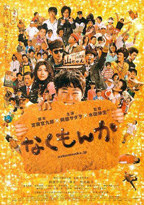

Nakumonka
Japan 2009
Genre:
Comedy, Drama
Director:
Nobuo Mizuta
Cast:
Sadao Abe
Eita
Yuko Takeuchi
Takashi Tsukamoto
Sarutoki Minagawa
Hairi Katagiri
Takanori Jinnai
Ayumi Ishida
Tsuyoshi Ihara

No More Cry
Story: Yuta Yamagishi (Sadao Abe) is abandoned by his father, a bon vivant, at a snack stall after he stole money from it.
The manager introduces the diligent boy to his world and eventually gives him the shop to manage when he has become an adult. Yuta's mother was
pregnant when his father seperated him from her and so he searches for his brother, at first to no avail. Finally, it turns out that Yusuke (Eita),
one half of the Kinji-Brothers, a very popular comedy duo, is his real brother. But Yusuke doesn't want to have anything to do with Yuta, because he
had to spent all his life without a family and only sees his comedy brother Daisuke (Takashi Tsukamoto) as his friend. Then there is also Tetsuko
(Yuko Takeuchi) who enters Yuta's life, the daughter of the former manager who disappeared years ago and returns home with two children of hers,
in order to marry him. Yuta is always making an effort to please everybody and therefore he has always a smile on his face. However, the time
has come for him to ask himself what he wants in life.
Review: Japanese comedies are oftentimes a bit awkward for western audiences, especially if they also feature a good amount of
drama. "No More Cry" is a movie that fits exactly into this category, yet manages at the beginning to score with a
good screenplay. Unfortunately, the plot dissolves more and more into chaos during the second half and a certain kind of frustration starts to
creep in. It isn't really necessary to work a message into a comedy, but if you try to do so then we should be allowed to expect a little bit
more structure than what we get here. Strangely enough "No More Cry" also doesn't work out outstandingly well as a comedy and still no one
would say that this is a bad movie.
The film begins with a voice-off and the narrator tells us about the family background of the two characters. Yuta is a man who has been abandoned
by his father but was affectionately taken in by another family. Therefore, he feels as if he owes them something as well as all his friends and
neighbors. To thank them he runs every possible errand for them and does certain repairs. He never says no and always has a smile on his face.
Even when he takes Tetsuko as his wife one has to wonder if maybe he just does this because he believes that he owes this to her and his foster
father. Even his own wife fears that this might be the case. Thus, Yuta remains a man who isn't easy to grasp and who obviously wears a mask that
he can never take off.
His brother Yusuke on the other hand hasn't much to laugh about, but nonetheless is part of a successful comedy duo. Since seriousness is one of the
most crucial ways of creating laughter (according to his friend) he seems to be just made for the job. Life was never good to Yusuke, his father
left him and his mother died shortly after his birth so that he grew up as an orphan. If life treats you as bad as him you simply have no other
choice but to become unhappy. When suddenly his brother turns up at his door he naturally doesn't want anything to do with his former family at first,
but he soon realizes that Yuta in his very own unique way carries scars in his heart as well and this creates a bond between them in a very special
manner.
Therefore, the relationship between two brothers who slowly have to get to know each other stands in the story's center. Yuta, who is constantly smiling
in order to avoid crying and when he cries then only in an exaggerated fashion because of a manipulative book or film, and Yusuke, who makes others
laugh while not being able to do that himself. How tragic their family story actually is becomes apparent when their father suddenly pops up again.
At this point the movie almost becomes a drama but despite the subject there is still always a certain lightheartedness that is also created thanks to
the colorful pictures and the very family-like atmosphere of the neighborhood in which Yuta's snack stall is located and in which everyone knows
each other.
Apart from the appealing pictures there are also some small things that are convincing like the soundtrack by Taro Iwashiro. However, even more
important aspects are neglected. For example there are nearly no moments in this comedy that can actually make you laugh. Yuta's overacting isn't
working in this respect and the same goes for other slapstick moments or humorous passages. Instead there are a few momemts when "No More Cry"
manages to wrap up worldly wisdom in its dialogues. The characters are well drawn so that we are actually feeling moved by their fate but the spark
isn't really ignited after all, most likely because drama and comedy are mixed together here without this actually being a tragicomedy. A good amount
of the humor consists of play on words and references to Japanese culture, so that they will elude most viewers, too. However, with a script that wouldn't
have lost its way in total chaos towards the end "No More Cry" actually could have become an extraordinary film.

Disclaimer





















